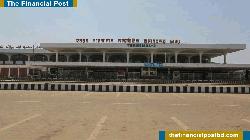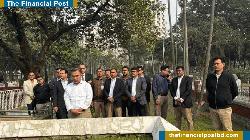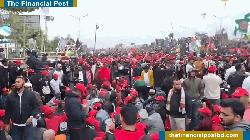After the July mass uprising, Bangladesh stands before an unstable reality. Political turmoil, uncertainty in governance, disruption in industrial production, risks in the export sector—particularly in the ready-made garments industry—and the slowdown of foreign investment have together pushed the economy into deep crisis. In this situation, remittances from expatriates have become the only major lifeline for the economy. Sending billions of dollars' worth of foreign currency home every month, they are artificially keeping Bangladesh's economy afloat. But behind this flow of money are the people who toil endlessly, and yet their own financial and social realities remain largely undiscussed.
Bangladesh's migrant workforce can broadly be divided into two categories. The first group consists of labor migrants in the Middle East and Southeast Asia, who are mostly employed as construction workers, domestic helpers, drivers, shop assistants, or other low-skilled laborers. The second group includes skilled professionals based in Europe, North America, Canada, and Australia, who work mainly in IT, healthcare, engineering, education, or business. There is a wide disparity in the economic and social conditions of these two groups, though both are crucial sources of foreign exchange for Bangladesh.
The lives of those in the Middle East are typically very difficult. Many borrow heavily—often at high interest rates—or pay exorbitant fees to brokers in order to migrate. The first few years abroad are spent merely repaying these debts. Their salaries are often much lower than expected; in the Gulf region in particular, wages remain stagnant for years even as the cost of living rises rapidly. Housing, food, and transportation expenses have all gone up. As a result, workers are forced to minimize their own living standards to the lowest level in order to send money home. They often live 8–10 people crammed into a single room, eat the bare minimum, and sometimes even conceal illnesses to avoid medical expenses and keep working.
On the other hand, expatriates in developed countries are relatively better off but face different challenges. The cost of living in Europe and America is high, and the complex processes of visas, immigration papers, or citizenship create additional pressure. For newcomers in particular, survival itself is tough at the outset. Securing good jobs takes time, and when rent and other expenses are met, their earnings are often insufficient to send money home. As a result, the tension between family expectations and the harsh reality of life abroad leaves many mentally distressed.
After the July uprising, a new kind of financial crisis emerged at home. Many families lost their domestic sources of income and became entirely dependent on their expatriate members. This has multiplied the pressure on migrants. With increasing demands from home, they are compelled to remit beyond their capacity. Many take on extra shifts, while some continue working relentlessly even at the risk of their health. This situation has severe impacts on their physical and mental well-being.
Another significant issue is the social life of migrants. Laborers in the Middle East, in particular, live in very restricted social circumstances. They have limited access to entertainment, family life, or cultural activities. Many go years without seeing their families. Their children grow up, parents pass away, yet they cannot return home—for returning often means losing their jobs and not finding new opportunities. Meanwhile, expatriates in developed countries, though often living with their families, face new social challenges. Their children often assimilate more deeply into local cultures, weakening their ties to the Bangla language, traditions, and homeland. This erodes Bangladeshi identity among the second generation, which, if left unaddressed, could weaken the future flow of remittances.
There are also shortcomings in remittance policy. The government has offered various incentives to encourage remittances through formal channels, such as cash bonuses. But in practice, many migrants prefer informal systems like hundi because transactions are faster and exchange rates are more favorable. This causes the state to lose foreign exchange, while migrants themselves remain vulnerable to risk. Moreover, bureaucratic inefficiencies in Bangladeshi banks and exchange houses often discourage migrants further.
For Bangladesh to build a sustainable economy, it cannot remain dependent solely on migrant remittances. Remittances are an emergency lifeline, not a permanent solution. To ensure long-term stability, the country must expand industrialization, enhance agricultural productivity, invest in technology, and create more jobs at home. Migrants' hard-earned money must be invested in productive sectors so that the domestic economy grows stronger. At the same time, providing training and skill development opportunities for migrants is essential, so they can secure skilled professions abroad and earn higher incomes rather than being confined to low-wage labor.
A looming challenge for Bangladesh is the second and third generations of expatriates. Growing up abroad, they are relatively disconnected from their ancestral homeland. Many are reluctant or indifferent to sending money to Bangladesh. Unless the state and society actively engage them through cultural programs, investment opportunities, or policies like dual citizenship, the flow of remittances may decline in the future.
Therefore, when we say remittances are keeping Bangladesh's economy alive, we must understand that behind this money lies human suffering, sacrifice, and relentless labor. Migrants themselves are not economically secure. Many live amid constant uncertainty, physical hardship, and social isolation. National policy must not only value the money they send but also address their quality of life, rights, and dignity. Ensuring safe migration, labor rights, easier remittance transfers, and reintegration plans for returnees is urgently needed.
The future of Bangladesh's economy does not rest solely on remittances; it depends on how we value our migrants' contributions and whether we can channel their earnings into building a sustainable economic foundation. Migrants should not be seen merely as sources of foreign currency but as invaluable assets of the nation. If their hard-earned money is to truly benefit the country, the state must also commit to solving their real-life problems.
In conclusion, the economic crisis that unfolded after the July uprising has been mitigated largely through remittances. But while the economy is rescued, the migrants themselves risk being lost in a shadow of neglect. If we ignore their dreams, struggles, rights, and future, one day even this lifeline of remittances may falter. Now is the time to focus deeply on their living conditions and financial reality—for they are not just the lifeblood of the economy but also an inseparable part of Bangladesh's social and cultural existence.
Shahidul Alam Swapan, Switzerland-based Private Banking Financial Crime Specialist, Columnist & Poet
FP/MI


 Zubayer Rahman Chowdhury takes oath as Bangladesh Chief Justice
Zubayer Rahman Chowdhury takes oath as Bangladesh Chief Justice
 Hadi murder: All culprits will be unveiled, charge sheet by 7 Jan, says DMP chief
Hadi murder: All culprits will be unveiled, charge sheet by 7 Jan, says DMP chief
 8 flights diverted as dense fog disrupts Dhaka airport
8 flights diverted as dense fog disrupts Dhaka airport
 Tarique Rahman and daughter register as voters ahead of polls
Tarique Rahman and daughter register as voters ahead of polls
 Tarique Rahman offers prayers at younger brother Koko's grave
Tarique Rahman offers prayers at younger brother Koko's grave
 Rumeen Farhana collects nomination paper for Brahmanbaria-2
Rumeen Farhana collects nomination paper for Brahmanbaria-2
 Tarique leaves for 300 feet area from airport
Tarique leaves for 300 feet area from airport
 300 Feet area turns into ‘sea of people’ despite biting cold
300 Feet area turns into ‘sea of people’ despite biting cold
 Tarique's flight lands in Sylhet; crowds grow larger at 300 Feet
Tarique's flight lands in Sylhet; crowds grow larger at 300 Feet
 Blast hits mosque during evening prayers in Nigeria’s Maiduguri: Witness
Blast hits mosque during evening prayers in Nigeria’s Maiduguri: Witness